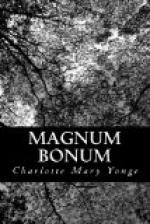There was something touching in her incoherent earnestness, which made the Colonel smile, yet wink away some moisture from his eyes, as he again thanked her without either acceptance or refusal. Then he said he was going to Belforest, and asked whether she would not like to come and look over the place. He would go back and call for her with the pony carriage.
“But would not Ellen like to go?” she said. “I will walk with the boys.”
The Colonel demurred a little, but knowing that his wife really longed to go, and could not well be squeezed into the back seat, he gave a sort of half assent; and as he left the house, Mother Carey gave a summoning cry to gather her brood, rushed upstairs, put on what Babie called her “most every dayest old black hat;” and when Colonel and Mrs. Brownlow, with Jessie behind, drove into the park, it was to see her careering along by the short cut over the hoar-frosty grass, in the midst of seven boys, three girls, and two dogs, all in a most frisky mood of exhilaration.
Distressed at appearing to drive up like the lady of the house, her Serene Highness insisted on stopping at the iron gates of the stately approach. There she alighted, and waited to make the best setting to rights she could of the heiress’s wind-tossed hat and cloak, and would have put her into the carriage, but that no power could persuade her to mount that triumphal car, and all that could be obtained was that she should walk in the forefront of the procession with the Colonel.
There was nobody to receive them but Richards, for the servants had been paid off, and only a keeper and his wife were living in the kitchen in charge. There was a fire in the library, where the Colonel had business to transact with Richards, while the ladies and children proceeded with their explorations. It was rather awful at first in the twilight gloom of the great hall, with a painted mythological ceiling, and cold white pavement, varied by long perspective lines of black lozenges, on which every footfall echoed. The first door that they opened led into a vast and dreary dining-room, with a carpet, forming a crimson roll at one end, and long ranks of faded leathern chairs sitting in each other’s laps. At one end hung a huge picture by Snyders, of a bear hugging one dog in his forepaws and tearing open the ribs of another with his hind ones. Opposite was a wild boar impaling a hound with his tusk, and the other walls were occupied by Herodias smiling at the contents of her charger, Judith dropping the gory head into her bag, a brown St. Sebastian writhing among the arrows; and Juno extracting the painfully flesh and blood eyes of Argus to set them in her peacock’s tail.
“I object to eating my dinner in a butcher’s shop,” observed Allen.
“Yes, we must get them out of this place,” said his mother.
“They are very valuable paintings,” interposed Ellen. “I know they are in the county history. They were collected by Sir Francis Bradford, from whom the place was bought, and he was a great connoisseur.”




